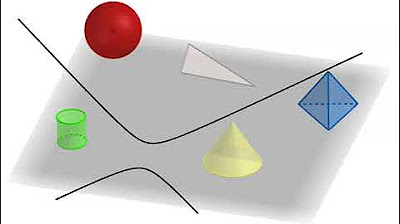Lecture 01: Two Ideas, Vast Implications
TLDRThis calculus lecture series promises to demystify the subject, showcasing its relevance in everyday life and its historical significance. The instructor highlights calculus' role in understanding motion, economics, and social sciences, emphasizing its impact on technological advancements. The course will delve into the fundamental concepts of derivatives and integrals, their applications, and their connection through the fundamental theorem of calculus. The series aims to present calculus as an accessible, intriguing, and beautiful field of study, dispelling its reputation as a daunting subject.
Takeaways
- 📚 Calculus is a fundamental mathematical concept that has a wide range of applications in various fields, including physics, economics, and biology.
- 🚗 The script uses everyday examples like driving a car and throwing a baseball to illustrate the relevance of calculus in understanding motion and change.
- 🌟 Calculus has been instrumental in shaping our modern world through its role in technological developments and scientific understanding.
- 🤔 The effectiveness of calculus lies in its ability to address complex issues related to change and motion, which were previously considered paradoxical.
- 🏛 The historical development of calculus spans over 2,500 years, with contributions from various mathematicians such as Pythagoras, Eudoxus, and Archimedes.
- 🧩 The script highlights two main concepts in calculus: the derivative, which deals with instantaneous change, and the integral, which is about accumulation and growth.
- 🔗 The fundamental theorem of calculus connects the derivative and the integral, showing that they are two sides of the same coin.
- 📈 The course aims to emphasize the conceptual understanding of calculus over its mechanical computation, aiming to demystify its perceived complexity.
- 📚 The reputation of calculus as a difficult subject is addressed, with encouragement that understanding it is a gradual process even for experienced mathematicians.
- 👨🏫 The instructor's goal is to present calculus in an accessible and friendly manner, focusing on the ideas and perspectives it offers rather than its mechanical aspects.
- 🌐 The course structure is outlined, beginning with the introduction of the derivative and integral, followed by their applications and historical context.
Q & A
What is the main focus of the calculus course described in the script?
-The main focus of the calculus course is to guide the students through the fundamental ideas of calculus, emphasizing the concepts of the derivative and the integral, and their applications in various fields, rather than just the mechanical side of calculations.
How does the script describe the impact of calculus on our daily lives?
-The script describes the impact of calculus on daily lives by giving examples such as driving, throwing a baseball, observing planetary orbits, watching TV, analyzing economic trends, and discussing population growth or decline, all of which involve the use of calculus.
What is the historical significance of calculus mentioned in the script?
-The historical significance of calculus mentioned in the script is that it has had a tremendous impact on allowing people to understand and manipulate nature. It forms the basis of much of the scientific description of our world, including motion, electricity, magnetism, sound waves, and water waves, as well as social and biological sciences.
What are the two fundamental concepts of calculus that the script mentions?
-The two fundamental concepts of calculus mentioned in the script are the derivative and the integral.
How does the script relate calculus to the resolution of Zeno's paradoxes?
-The script relates calculus to the resolution of Zeno's paradoxes by explaining that the issues of instantaneous motion and the idea of infinitely many traversals, which were raised by Zeno, were eventually resolved through the development of calculus.
What is the script's stance on the reputation of calculus being a difficult subject?
-The script acknowledges that calculus has a reputation for being a difficult and fearsome subject, but it aims to present it in a way that makes it seem more approachable and friendly, emphasizing the ideas and concepts rather than just the mechanical methods.
What does the script say about the origin of the word 'calculus'?
-The script suggests that the word 'calculus' comes from the Greek word 'calculi', which means stones, and these stones were used for counting in ancient Greek times. It humorously implies that the hardness of stones might be related to the subject's reputation for difficulty.
How does the script describe the connection between the derivative and the integral?
-The script describes the connection between the derivative and the integral as being connected by the fundamental theorem of calculus, which is introduced in lecture four.
What is the script's approach to teaching calculus in the lectures?
-The script's approach to teaching calculus involves starting with the fundamental ideas of the derivative and the integral, exploring them in different contexts such as physical, graphical, and algebraic perspectives, and then demonstrating their richness through examples, extensions, and applications.
What is the script's view on the importance of understanding the concept of limits in calculus?
-The script views the understanding of limits as a crucial aspect of calculus, mentioning that it took several hundred years after calculus was invented for the concept of limits to be fully understood and formalized.
Outlines
📚 Introduction to Calculus and Its Ubiquity
The speaker introduces the concept of calculus as a fundamental tool in understanding the world around us, highlighting its relevance in everyday life from driving and sports to space exploration and economics. Calculus is presented as a collection of ideas that have significantly impacted human history by enabling us to manipulate nature to serve our purposes. The speaker emphasizes that calculus is not only crucial for physical sciences but also for social and biological sciences. The historical significance of calculus in shaping the last 300 years of technological development is underscored, with a teaser about the effectiveness of calculus in resolving issues related to change and motion, referencing Zeno's paradoxes from 2500 years ago.
🏹 Zeno's Paradoxes and the Birth of Calculus
This paragraph delves into Zeno's paradoxes of motion, which posed significant philosophical questions about the nature of movement that were not resolved for over two millennia. The paradoxes, such as the one involving an arrow in flight, challenge our understanding of motion by suggesting that at any given instant, the arrow is not moving, which contradicts our everyday experience. The speaker explains that these paradoxes, which deal with the concept of infinity and instantaneous motion, were eventually addressed by the advent of calculus. The paragraph also touches on the broader implications of calculus in allowing us to view familiar occurrences in new ways and its role in the development of scientific understanding.
📘 The Misconception of Calculus as a Difficult Subject
The speaker discusses the common perception of calculus as a challenging and intimidating subject. This reputation, possibly stemming from the Greek word 'calculi' meaning stones, which were hard, is contrasted with the goal of the course to present calculus as accessible and friendly. The speaker humorously references Sir Winston Churchill's struggle with mathematics and his vivid description of differential calculus as a dragon. Additionally, the size and complexity of calculus textbooks are mentioned as contributing factors to its daunting reputation, with a sample textbook featuring over 1300 pages serving as a visual example.
📘 The Essence of Calculus: Derivative and Integral
The essence of calculus is distilled into two fundamental concepts: the derivative and the integral. The speaker explains that these ideas stem from everyday observations and can be understood without complex vocabulary or notation. The derivative is introduced as a measure of instantaneous change, while the integral is described as a way to view the accumulation of small quantities into larger ones. The connection between these two concepts is highlighted through the fundamental theorem of calculus, which will be discussed in a later lecture. The historical development of calculus is briefly touched upon, setting the stage for a more detailed exploration in subsequent lectures.
🕰️ The Historical Development of Calculus
This paragraph provides a historical overview of the development of calculus, spanning over two and a half millennia. It begins with Pythagoras in the sixth century and continues through the contributions of Eudoxus, Euclid, Archimedes, and others up to the 17th century. The speaker mentions Johannes Kepler, Galileo Galilei, Pierre de Fermat, and Bonaventura Cavalieri, leading to the pivotal figures Isaac Newton and Gottfried Wilhelm Leibniz, who are most closely associated with the invention of calculus. The paragraph also acknowledges the incremental nature of calculus's development and the subsequent work by mathematicians such as the Bernoulli brothers, Leonhard Euler, Joseph Louis Lagrange, and others, culminating in the rigorous definition of the limit in the mid-19th century.
📚 The Structure and Purpose of the Calculus Course
The speaker outlines the structure of the upcoming calculus course, which begins with an introduction to the concepts of the derivative and integral, followed by the fundamental theorem of calculus that connects them. The lectures will then explore these concepts in detail, examining them from various perspectives such as graphically, algebraically, and through their applications. The speaker emphasizes the goal of the course to provide a clear understanding of calculus concepts and to demonstrate their relevance and beauty. The course aims to show that calculus is not only a powerful tool for measuring change but also an intellectually intriguing and beautiful field of study.
Mindmap
Keywords
💡Calculus
💡Derivative
💡Integral
💡Change and Motion
💡Zeno's Paradoxes
💡Fundamental Theorem of Calculus
💡Technological Developments
💡Conceptual Understanding
💡Limit
💡Applications
Highlights
Calculus is omnipresent in everyday life, from driving and tracking speed to observing planetary motion.
Calculus plays a crucial role in various fields, including physics, economics, biology, and social sciences.
The historical impact of calculus is immense, shaping our scientific understanding and technological advancements.
Zeno's paradoxes of motion, proposed in 450 BC, raised questions about the nature of motion that were later addressed by calculus.
The paradox of the arrow in flight and the dichotomy paradox challenge our understanding of instantaneous motion.
Calculus provides a framework for dealing with infinity, a concept central to understanding motion.
The development of calculus was a gradual process, with contributions from many mathematicians over centuries.
The fundamental theorem of calculus connects the derivative and the integral, two core concepts of calculus.
The derivative measures instantaneous change, such as speed, while the integral represents accumulation.
Calculus can be understood through simple, everyday observations, making abstract concepts more relatable.
Despite its reputation as a difficult subject, calculus can be made accessible and enjoyable through the right teaching approach.
Calculus has been described as a fearsome dragon, but the goal of this course is to make it a friend.
The size and complexity of calculus textbooks can be intimidating, but they are built on just two fundamental ideas.
The historical development of calculus involved incremental progress and a collaborative effort by many mathematicians.
Understanding calculus took centuries, even after its invention, highlighting the complexity of the subject.
The course aims to clarify the concepts of calculus and demonstrate its relevance and beauty, beyond its practical applications.
Calculus is presented as an intellectual achievement that can be appreciated, enjoyed, and understood by everyone.
Transcripts
5.0 / 5 (0 votes)
Thanks for rating:





